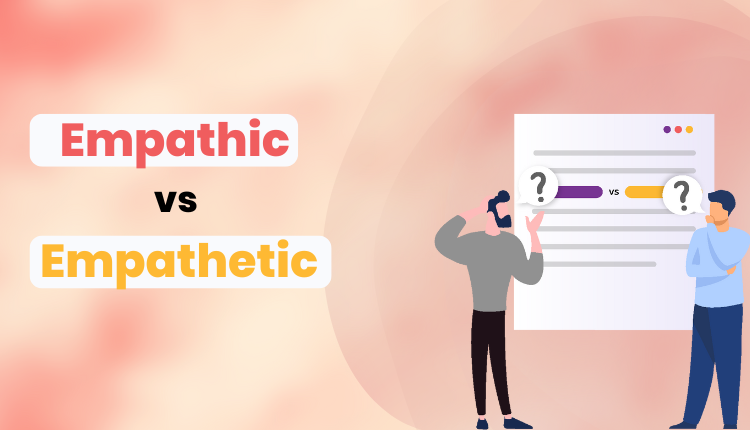The English language has many similar words with subtle differences, like “empathic” and “empathetic.” Though often used interchangeably, understanding their nuances can improve communication, especially in professional and personal settings. This article breaks down their meanings, differences, usage, and how to apply them effectively in business writing.
What Does Empathic Mean?
The word empathic is an adjective form of “empathy,” which is the capacity to know and to feel what another person is experiencing. “Empathic” refers to a person or entity that shows or indicates empathy. The term has been used since the early 20th century and tends to be preferred in scientific and psychological usage.
Example Usage:
- “Her empathic reaction to the patient’s issues established confidence.”
- “Psychological research frequently studies empathic behavior in social encounters.”
Though “empathic” is not as used in normal speech, it is accepted in scholarly and medical discourse.
What Does Empathetic Mean?
The term empathetic also comes from “empathy” and has the same basic meaning. It refers to being able to experience and feel another’s feelings. “Empathetic” is the preferred word in informal and business discourse.
Example Usage:
- “He was an empathetic listener, always offering support and understanding.”
- “The teacher’s empathetic approach helped struggling students feel valued.”
Although both words convey the same idea, “empathic” is used more often in scientific, psychological, and technical writing.
Main Differences Between Empathic and Empathetic
Even though the two words have the same root and definition, there are notable differences in their use:
| Feature | Empathic | Empathetic |
| Usage | More common in scientific, psychological, and technical writing | Preferred in everyday language and business communication |
| Frequency | Less commonly used | More widely accepted |
| Tone | Sounds more formal and clinical | Sounds more natural and conversational |
| Historical Preference | Earlier usage in psychology and philosophy | Gained popularity in the late 20th century and is now more mainstream |
Essentially, “empathic” is a bit more formal a word, while “empathetic” sounds more natural and generally accepted in everyday use.
Usage Examples in Sentences
Learning how these words are used in sentences can help distinguish between them:
- “The therapist showed an empathic awareness of her patient’s trauma.”
- “As a leader, it is empathetic towards employees that creates a good office culture.”
- “His empathic skill made him a great researcher of human behavior.”
- “The customer service agent was very empathetic, making sure the client felt heard.”
Both words can fit into these situations, but “empathetic” is likely to sound more natural in conversational speech and business writing.
How to Use ‘Empathetic’ or ‘Empathic’ in Business Writing
Effective communication is important in business environments. Both “empathic” and “empathetic” are acceptable, depending on the tone and reader of your writing.
- Customer Relations:
- Utilize “empathetic” when communicating with clients or customers to achieve a warm and friendly tone.
- Example: “We value your concerns and make every effort to offer empathetic support.”
- Leadership and Management:
- The leaders who exercise empathy tend to relate more effectively to their teams. “Empathetic” is a more suitable term when communicating internally.
- Example: “An empathetic leader empathizes with the issues their employees face and seeks to solve them.”
- Scientific and Technical Writing:
- “Empathic” is found more frequently in research and analysis.
- Example: “Research indicates empathic people show increased neural activity when exposed to emotional stimuli.”
- Marketing and Branding:
- Brands seeking emotional rapport with their audience tend to use “empathetic” to express understanding and concern.
- Example: “Our brand believes empathetic storytelling helps us connect with our customers.”
Which One Should You Use?
So, which word should you use? It depends on the situation:
- When writing informally or in a professional setting, empathetic is the safer option.
- When writing to an academic, scientific, or psychological reader, empathic could be preferable.
- When unsure, empathetic is the more widely accepted and safer option.
How Trinka Grammar Checker Can Help
Trinka Grammar Checker is a robust engine that aims to improve your writing. It’s sensitive to language nuances and makes sure that you use words such as “empathic” or “empathetic” accurately, depending on context. This can be very handy at work where accuracy counts.
With Trinka’s sophisticated recommendations, you’ll catch not only grammar mistakes but also enhance clarity and tone. The user-friendly interface allows you to easily tighten up your work in a matter of minutes, which means you can pay less attention to getting words perfect and more attention to getting emotions conveyed effectively.
Conclusion
Although “empathic” and “empathetic” both convey the same meaning, their application varies slightly depending on context. “Empathic” is used more frequently in scientific and psychological contexts, while “empathetic” is used frequently in common parlance, corporate communication, and brand usage. Having an appreciation for these differences allows you to select the appropriate word based on your audience and context. And with the help of Trinka Grammar Checker, it has never been easier to use the correct version.
Whatever empathic or empathetic nature you think you possess, the importance is to work at using real empathy in interaction and communication.

